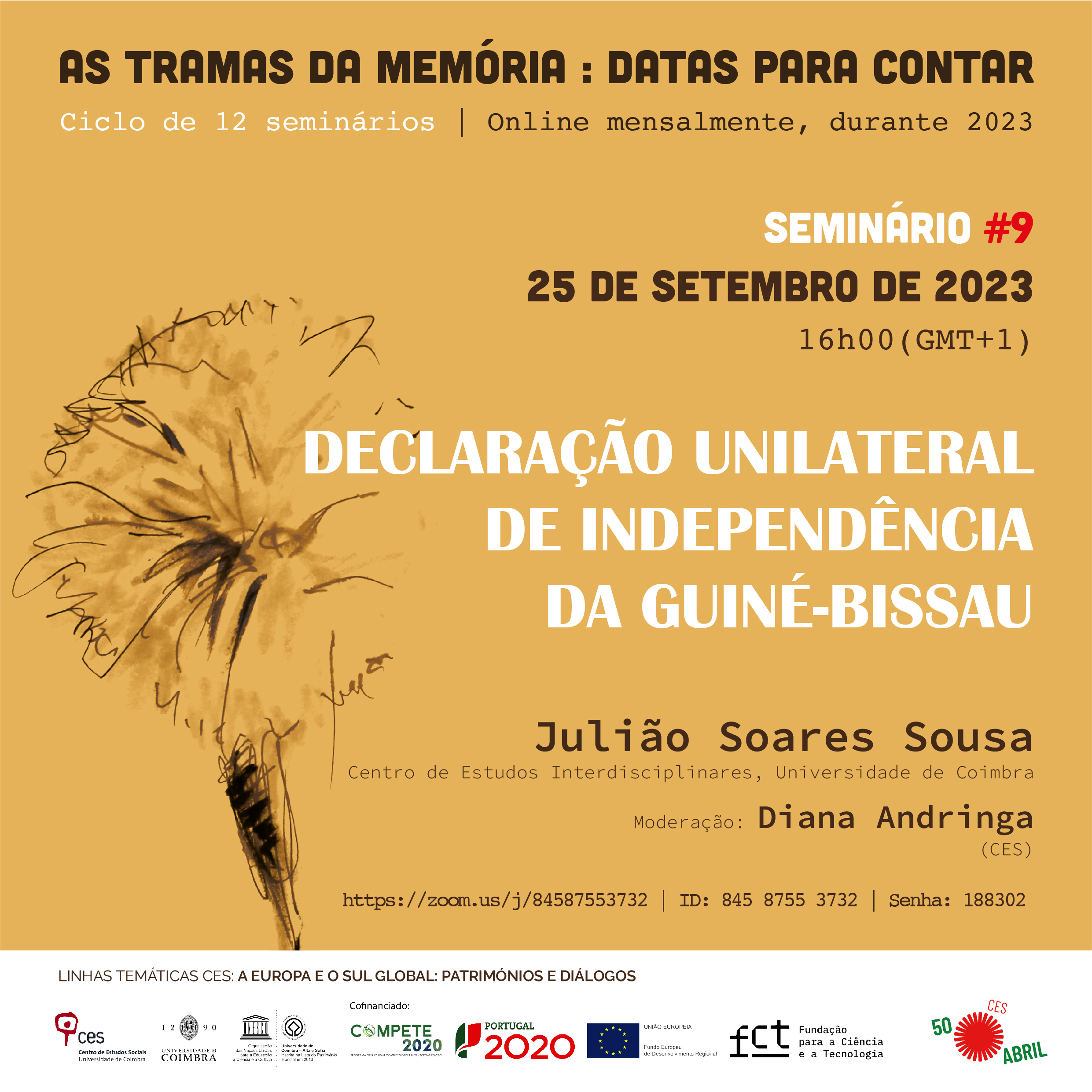Seminar | Series 'The Weft of Memory: dates to count'
Unilateral declaration of independence of Guinea-Bissau
Julião Soares Sousa (Centro de Estudos Interdisciplinares, Universidade de Coimbra)
September 25, 2023, 16h00 (GMT+1)
Online event
About
Moderation: Diana Andringa (CES)
About
This seminar is part of the series The Weft of Memory: dates to count, organised by the coordination of the thematic line Europe and the Global South: heritages and dialogues. The series aims to mark and reflect on less resounding dates, but equally determinant for the construction of the 25th of April 1974 and the independence of Portuguese-speaking African countries and East Timor. The seminars take place online, whenever possible on the date to be marked, every month, at 16h00, throughout 2023.
On 25 September 1973 Guinea Bissau in the midst of the Colonial War/Liberation War unilaterally declared independence. What did it mean? What impact did it have?
Bio notes
Julião Soares Sousa | Integrated Researcher in the History and Memory Group of the Center for Interdisciplinary Studies of the 20th Century at the University of Coimbra; Collaborating Researcher in the Group at the Institute of Contemporary History of the Faculty of Social and Human Sciences of Universidade Nova de Lisboa; He was an Associate Researcher at the National Institute of Studies and Research (Guinea-Bissau). He is a member of the Editorial Board of the journal Desafios da Cátedra Amílcar Cabral (University of Cape Verde) and a member of the Scientific Board and the Advisory Board of the Center for Interdisciplinary Studies of the 20th Century University of Coimbra. He is a member of the Scientific Council of Sintidus Magazine of the Lusófona University of Guinea-Bissau. He was distinguished with the Diploma of Merit by the Amílcar Cabral Foundation (January 2021) and with the Calouste Gulbenkian Foundation Prize, Modern and Contemporary History of Portugal, by the Portuguese Academy of History (2011), for the book Amílcar Cabral (1924-1973). Life and Death of an African Revolutionary. He was Guest Professor of the Master in African Studies at the Department of Anthropology at the University of Coimbra (2007). Between 2010 and 2011 he was Invited Adjunct Professor of the Master in Security, Defense and Conflict Resolution and Post-Graduation in Criminology at the Higher Institute of Information and Administration Sciences in Aveiro (ISCIA).
Diana Andringa was born in 1947, in Dundo, Lunda-Norte, Angola. She came to Portugal in 1958. In 1964, she enrolled at the Faculty of Medicine of the University of Lisbon, dropping out later to dedicate herself to Journalism. In 1968, she attended the 1st course in Journalism implemented by the Portuguese Union of Journalists, joining Viva Mundial journal, quitting the job as a result of a collective resignation. Unemployed, she was a marketing copywriter until she was arrested by PIDE, in January 1970. Sentenced to 20 months prison term for supporting the independence of Angola, she then restarted her career in journalism. From 1078 to 2001, she was a journalist at RTP. She was also a columnist at Diário de Notícias, RDP and Público, and short-term associate director of Diário de Lisboa. Currently, she is an independent documentary filmmaker - Timor-Leste, O sonho do Crocodilo; Guiné-Bissau: As duas Faces da Guerra; Dundo, Memória colonial, Tarrafal: Memórias do Campo da Morte Lenta. She reattended University, concluding her PhD degree in Sociology of Communication at ISCTE, in 2013.
_____________
This activity will be provided through Zoom platform and does not require registration. Participation is limited to the number of places available >> https://zoom.us/j/84587553732 | ID: 845 8755 3732 | Password: 188302
Please keep the microphone on mute until the discussion is open. The host may remove disruptive participants.
Open activities in digital format, such as this one, do not grant a declaration of participation. Such document will only be guaranteed in events with prior registration and regulated access.


